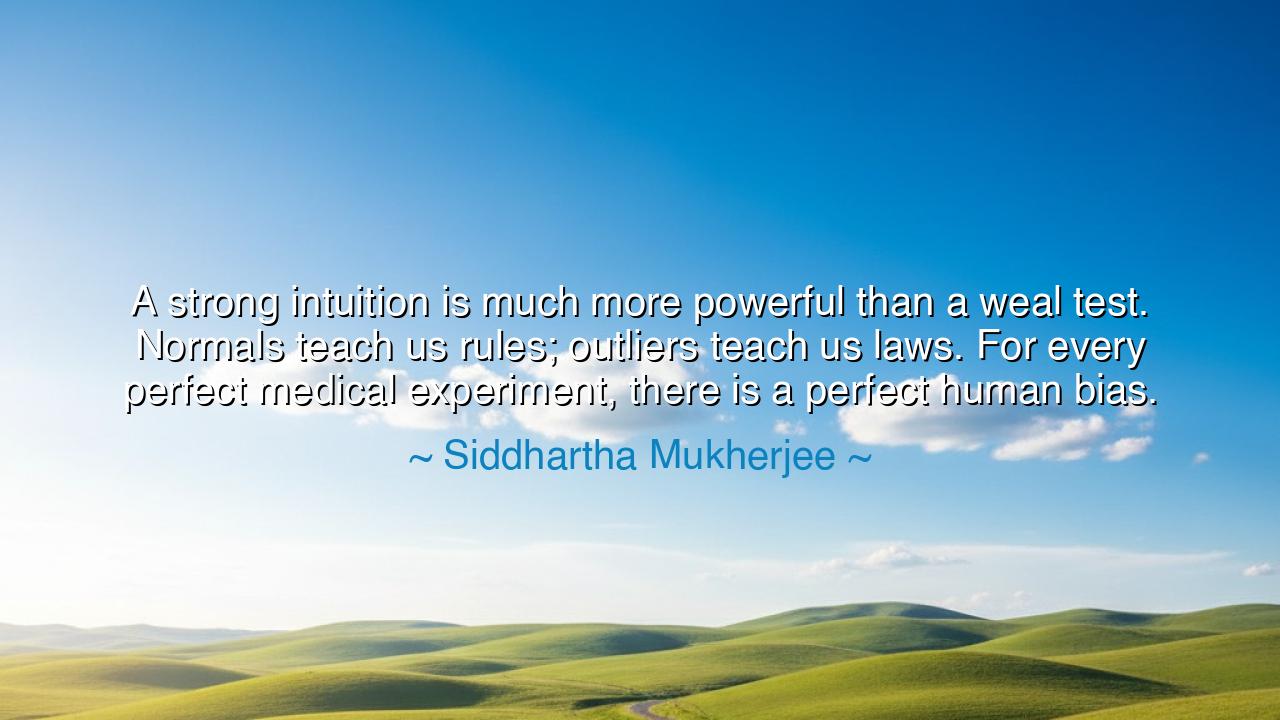
A strong intuition is much more powerful than a weal test.
A strong intuition is much more powerful than a weal test. Normals teach us rules; outliers teach us laws. For every perfect medical experiment, there is a perfect human bias.






In the heart of every great discovery, there is an intuition, a deep knowing that precedes the cold logic of reason and the rigidity of tests. Siddhartha Mukherjee, a master of insight and reflection, offers this wisdom: "A strong intuition is much more powerful than a weak test. Normals teach us rules; outliers teach us laws. For every perfect medical experiment, there is a perfect human bias." These words strike at the very essence of knowledge, revealing the tension between reason and intuition, between the predictable world of rules and the vast, mysterious realm of outliers.
It is said that intuition is the soul's understanding of what the mind has yet to learn. It is an instinct, a whisper of wisdom that does not require the steady march of scientific method or the cold precision of experiments. In matters of life, the sharpest of intuitions often reveal truths that no test could ever confirm, just as an artist’s brushstrokes can capture the truth of a soul better than any photograph. Weak tests, however, are bound by their own limitations—unable to account for the full complexity of the human spirit or the depth of the universe’s mysteries.
Consider, for example, the life of Marie Curie, whose intuition and relentless pursuit of knowledge led her to discover the secrets of radioactivity. Though her experiments were rooted in rigorous scientific methodology, it was her inner knowing, her profound connection to the unseen forces of nature, that guided her through the many challenges she faced. She saw beyond the rules of physics and into the laws of the universe, recognizing that the world was governed by principles far more intricate than mere patterns on paper.
Mukherjee's second truth—that "Normals teach us rules; outliers teach us laws"—reminds us of the profound value found in the exceptions to the norm. The outliers, those who do not fit neatly into the boxes of convention, are the true pioneers of human knowledge. The rules are mere guidelines, useful and necessary for steady progress, but it is in the outliers—the anomalies, the deviations, the unexpected discoveries—where the true laws of nature are often revealed. It is the eccentric genius who, through an act of boldness, reveals the hidden truths that rules alone cannot.
A notable example of this can be seen in Sir Isaac Newton, whose discovery of the law of gravity came not from following a known rule but from questioning the very foundations of how the world worked. He did not just accept the status quo of scientific understanding; instead, he ventured into the realm of outliers, challenging what had been accepted for centuries. His intuition guided him toward the discovery of a law that governs all of nature, not because it was a predictable outcome, but because he dared to look beyond the rules to uncover a deeper truth.
The third element of Mukherjee’s quote speaks of the human bias that influences even the most seemingly perfect medical experiment. Bias, that invisible force, shapes our perceptions and actions, often clouding our judgment and blinding us to the truth. The notion that every experiment is tainted by bias reminds us of the imperfection inherent in human nature. Even the most precise of tests cannot escape the influence of human limitations, whether they are shaped by cultural, emotional, or psychological factors. A perfect test may exist in theory, but it is only through the imperfect lens of humanity that we come to understand it.
The lesson here, then, is one of humility. No matter how powerful the test, no matter how well designed, we must recognize that the truth cannot be fully captured through mere data. Intuition and experience must walk hand in hand with the scientific method. The outliers, the deviations from the norm, hold within them lessons that challenge our preconceived notions and open new pathways of understanding.
To the reader, I say this: trust your intuition. It is not a force to be dismissed but to be honed, cultivated, and respected. Understand that knowledge is not only found in the rules but also in the laws that emerge from the unexpected. Do not shy away from the outliers of life, for they often hold the keys to the greatest breakthroughs. And remember, even in the most perfect experiment, human bias will always play a role, reminding us of our shared limitations and urging us to approach every truth with a spirit of humility and openness.






AAdministratorAdministrator
Welcome, honored guests. Please leave a comment, we will respond soon